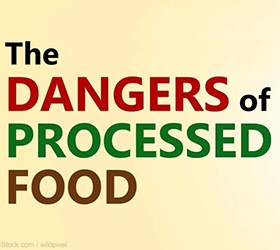
Ultra-processed foods and drinks, which come in packets and no longer look or taste like traditional foods, are one major hallmark of the Western diet. In high-income countries, ultra-processed foods are now dominating the food supply, and they are rapidly gaining ground in growing economies.
Ultra-processed foods have devastating effects on the microbiota. Everything we eat determines the type of species and the balance in our microbiome. Studies comparing populations on a long-time Western diet, versus a rural African or agrarian diet, have reported very large differences in bacterial profiles, with significantly lower microbiota diversity and lower production of SCFAs in the Western diet. African children had bacterial species associated with fermentation of plant-based fibres and were completely deficient in Bifidobacterium.
The “Western diet,” rich in sugar, animal protein, processed fats and artificial additives, lacking in fibre, beneficial microbes, plant phytochemicals, vitamins and minerals, does not support our co-evolved microbe partnership and drives gut dysbiosis.
Even short-term consumption of a mostly animal or mostly plant diet can alter the microbiota composition and function as quickly as 24 hours. The changes appear to be significant and rapid, but the magnitude of the changes is usually small and dependant upon the degree of dietary changes, taking an average of 3.5 days for each diet-responsive bacterial group to reach a new steady state. However, repeated dietary shifts demonstrate that most changes to the microbiome appear to be reversible, while the abundance of certain bacteria depends on prior consumption of certain foods. In rats either continuously fed chow or a palatable cafeteria diet to a “cycled” group switched between the two diets, the microbiota of cycled rats was nearly indistinguishable from rats on the constant cafeteria diet, and both groups were significantly different than the chow group. This suggests that any small shifts in diet quality are not likely to make a big difference over time.
The good news is that shifting to healthier, more plant-based, non-processed based diets has repeatedly shown improvements in microbiota diversity and health outcomes. Shifting to a diet rich in fibre, polyphenols, a healthy ratio of omega 6:omega 3 fatty acids, and vegetable protein has repeatedly been shown to improve health outcomes including carbohydrate and lipid metabolism, gut microbiota and cognitive function. The change to the healthier diet decreased the glucose intolerance and the biochemical abnormalities caused by obesity as well as decreasing the oxidative stress and modifying the gut microbiota.
The added good news is that eliminating processed foods from your diet stops feeding many of the opportunistic, nasty bacteria and fungi. So the best way to control them is to starve them by eating healthy foods and avoiding the processed ones.